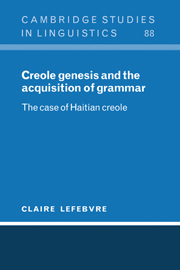Book contents
- Frontmatter
- Contents
- Tables
- Preface
- Abbreviations
- 1 The problem of creole genesis and linguistic theory
- 2 Cognitive processes involved in creole genesis
- 3 The research methodology
- 4 Functional category lexical entries involved in nominal structure
- 5 The preverbal markers encoding relative Tense, Mood and Aspect
- 6 Pronouns
- 7 Functional category lexical entries involved in the structure of the clause
- 8 The determiner and the structure of the clause
- 9 The syntactic properties of verbs
- 10 Are derivational affixes relexified?
- 11 The concatenation of words into compounds
- 12 Parameters
- 13 Evaluation of the hypothesis
- 14 Theoretical consequences
- Appendices
- Notes
- References
- Index of authors
- Index of languages and language families
- Index of subjects
1 - The problem of creole genesis and linguistic theory
Published online by Cambridge University Press: 23 November 2009
- Frontmatter
- Contents
- Tables
- Preface
- Abbreviations
- 1 The problem of creole genesis and linguistic theory
- 2 Cognitive processes involved in creole genesis
- 3 The research methodology
- 4 Functional category lexical entries involved in nominal structure
- 5 The preverbal markers encoding relative Tense, Mood and Aspect
- 6 Pronouns
- 7 Functional category lexical entries involved in the structure of the clause
- 8 The determiner and the structure of the clause
- 9 The syntactic properties of verbs
- 10 Are derivational affixes relexified?
- 11 The concatenation of words into compounds
- 12 Parameters
- 13 Evaluation of the hypothesis
- 14 Theoretical consequences
- Appendices
- Notes
- References
- Index of authors
- Index of languages and language families
- Index of subjects
Summary
This book addresses the cognitive processes hypothesised to account for the properties of creole languages. It presents a theory of creole genesis based on processes otherwise observed to play a role in language genesis and in language change in general. It is intended as a contribution to our understanding of the mechanisms by which the properties of the source languages of a creole manifest themselves in the creole in the way they do. This chapter summarises the salient features of creole languages which any theory of creole genesis must be able to account for and situates this book with respect to other approaches to the problem. Section 1.3 introduces the theoretical framework within which these problems are addressed. Section 1.4 presents the hypothesis underlying the research. Section 1.5 discusses the scope and limitations of this book.
The complex problem of pidgin and creole genesis
The history and structure of pidgin and creole languages are characterised by the following features. First, as was pointed out by Whinnom (1971), these languages are only developed in multilingual communities. Whinnom argues that, in bilingual communities, the speakers of one group will eventually learn the language of the other group.
Second, communities where pidgin and creole languages emerge generally involve several substratum languages spoken by the majority of the population and a superstratum language spoken by a relatively small but economically powerful social group. Crucially, the substratum community does not have one common language.
Information
- Type
- Chapter
- Information
- Creole Genesis and the Acquisition of GrammarThe Case of Haitian Creole, pp. 1 - 14Publisher: Cambridge University PressPrint publication year: 1999
Accessibility standard: Unknown
Why this information is here
This section outlines the accessibility features of this content - including support for screen readers, full keyboard navigation and high-contrast display options. This may not be relevant for you.Accessibility Information
- 1
- Cited by
